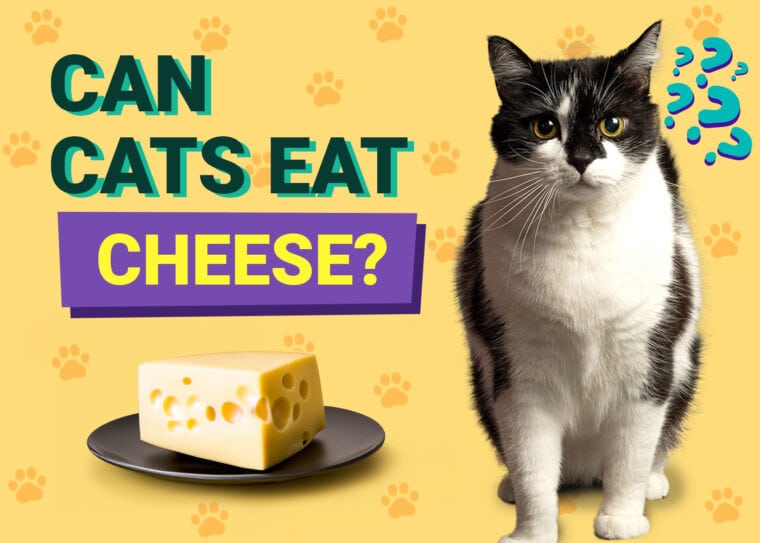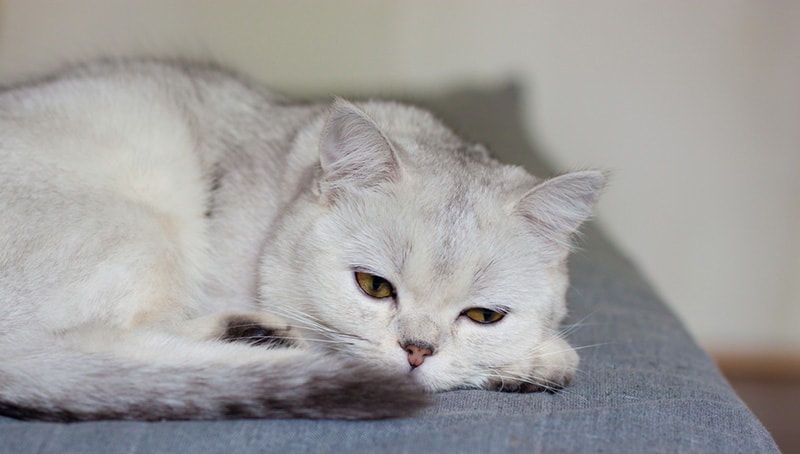
When we imagine giving cheese to a pet, a dog is most likely to appear in our minds (dogs are big fans of cheese, after all!). But our feline friends aren’t above begging for treats off our plate, including cheese. But can cats eat cheese?
If your kitty just grabbed a bite of cheese off your plate, you don’t need to worry because cheese isn’t toxic to felines (unless it’s blue cheese). However, this isn’t a food that’s healthy for cats, either. The biggest reason is that many cats are lactose intolerant,1 but it isn’t the only one.
Felines & Dairy
Picture a cat. There’s a good chance you picture an itty-bitty kitten sipping milk from a saucer. Cats and milk seem to go hand in hand. And while it’s true kittens can drink milk, cats are actually lactose intolerant. How does that work?
Dairy products contain lactose, a milk sugar, and when kittens are first born, their bodies have the needed enzymes to digest this properly. Kittens can digest lactose and dairy because they need to be able to drink mama cat’s milk, as, without the ability to drink milk, kittens wouldn’t survive very long.
However, as kittens get older and start weaning themselves off their mother’s milk, they gradually lose the enzymes needed to digest lactose and the ability to tolerate it. So, by the age of one, the majority of cats can longer handle dairy products. When that happens, eating dairy will affect felines much in the same way it affects lactose-intolerant humans—by causing bloating, gassiness, and diarrhea.
And because cheese contains lactose (though less than the amount found in milk), it can seriously upset your kitty’s stomach.

More Reasons to Avoid Cheese
So, most (but not all) cats will be lactose intolerant by age one, meaning cheese isn’t great for them. But while this is the most significant reason to avoid giving cheese to the kitty, there are a couple of other reasons you may want to avoid it.
For one, cheese is high in calories and high in fat. Being so calorie-dense means that even just a bit of cheese could add a ton of calories to your cat’s daily diet. So, overdoing it on the cheese (which wouldn’t take much) could lead to obesity in your pet. Feline obesity is already prevalent and can lead to a host of problems, such as diabetes, so if you do give your kitty cheese as an occasional snack, be sure to factor those calories into its daily caloric amount! Also, take into account that too many fatty foods could lead to pancreatitis.
Then there are seasonings used on some cheeses. Depending on how fancy the cheese is that you get, you might find that the cheese contains herbs and seasonings, such as onion and garlic, both of which are toxic to felines.
Finally, you should avoid any moldy cheeses, such as blue cheese or gorgonzola. These cheeses contain penicillium, a mold spore that is toxic to felines.

What About Non-Dairy Cheese?
There are many more plant-based options these days when it comes to food, so several non-dairy cheeses are available. But are these sorts of cheeses better for kitties? Not really. Though they won’t contain lactose, non-dairy cheeses usually have more oil and fat than dairy cheese. And that oil and fat could end with your kitty experiencing an attack of pancreatitis (not to mention adding extra calories to their diet).
These cheeses are non-toxic (unless they’ve been seasoned with something like garlic), but in reality, they aren’t any healthier for your pet.
Conclusion
While it’s fine for your cat to have a bite of cheese on occasion as it is non-toxic, it’s not the best treat for the cat. Cheese contains lots of calories and fat, which can lead to weight gain or health issues in your pet over time. Plus, most felines are lactose intolerant, so your pet may end up with an upset stomach. It’s better to stick with treats made specifically for cats instead!
Featured Image Credit: Nitr, Shutterstock







